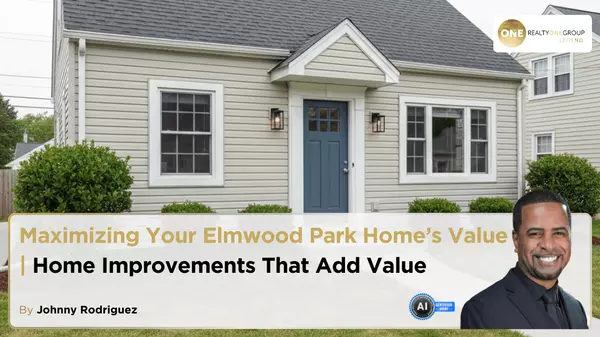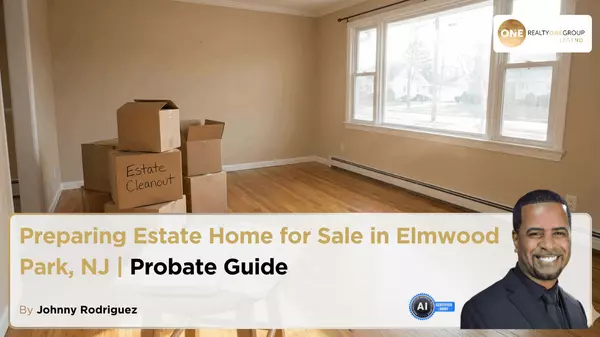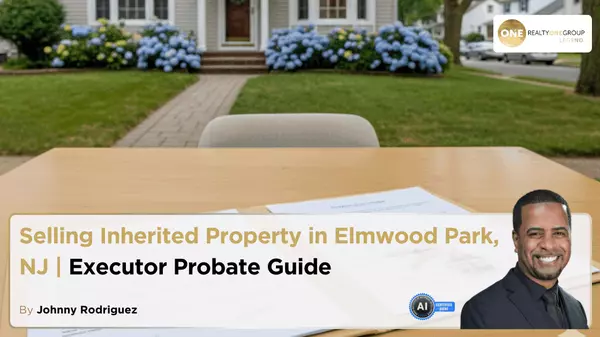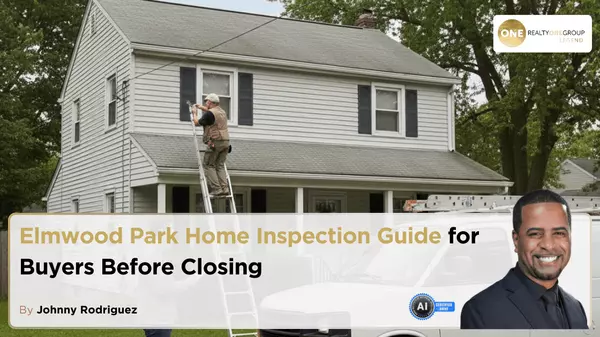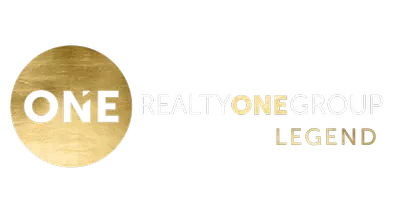What Is a Short Sale on a House? Process, Mistakes & Alternatives Explained
Buying a home can be tricky, especially if you're dealing with a short sale. If you're unfamiliar with the term, don’t worry! In this post, we’re going to explain what a short sale is, how it works, the process involved, and some common mistakes to avoid if you're thinking about buying or selling a short sale home.
What Is a Short Sale?
A short sale happens when a homeowner sells their property for less than the amount they owe on their mortgage. This typically occurs when the homeowner is facing financial difficulties and needs to sell before the lender forecloses on the property. All of the proceeds from the sale go to the lender, and the lender may either forgive the remaining debt or pursue a deficiency judgment to collect the balance.
While a short sale might sound like a simple way to sell a home, the process can be quite lengthy and involves several steps. It’s important to understand the ins and outs before getting involved.
Key Takeaways:
A short sale is usually initiated by the homeowner when they can’t pay their mortgage.
The lender must approve the sale, and the proceeds go to them.
The remaining mortgage balance may be forgiven or pursued by the lender.
A short sale can be a good deal for buyers, but the process is often slow and complicated.
Understanding a Short Sale
Short sales typically occur when the homeowner is in financial distress, often after missing mortgage payments. If the homeowner doesn’t sell the house before foreclosure begins, they may face more severe financial consequences. Short sales can also happen when property values drop, leaving homeowners with more mortgage debt than their house is worth.
Lender Sign-Off
For a short sale to happen, the homeowner must get approval from the lender, usually a bank or credit union. The homeowner must submit documentation to prove their financial hardship. Without this lender's sign-off, the short sale process can’t begin.
Warning
Even though a short sale can be a way to avoid foreclosure, it still negatively impacts the homeowner’s credit. However, it’s less damaging than a full foreclosure. It’s also important to note that lenders may still pursue the remaining mortgage balance after a short sale, depending on state laws.
Special Considerations
A short sale might be less damaging to your credit than a foreclosure, but it still counts as a negative mark on your credit report. The lender may also still hold you responsible for the difference between the sale price and the mortgage balance in some cases, called the “deficiency balance.”
Fast Fact
To convince the lender to approve a short sale, the homeowner needs to provide a valid financial hardship, like a job loss or medical emergency, rather than something that was withheld at the time the mortgage was originally approved.
Short Sale vs. Foreclosure
It’s crucial to understand the difference between a short sale and foreclosure, as they are both potential outcomes when a homeowner is unable to meet their mortgage payments.
How a Foreclosure Works
In a foreclosure, the lender takes possession of the home when the homeowner fails to make payments. The lender sells the property in an attempt to recover the remaining mortgage balance. This process is typically faster than a short sale because the lender is motivated to liquidate the asset quickly.
How a Short Sale Works
A short sale happens when the homeowner works with the lender to sell the home for less than what’s owed on the mortgage. While the homeowner can stay in the home during the process, it can take months for the sale to be approved by the lender. Once completed, the homeowner may be able to buy a new home sooner than if they had gone through foreclosure.
Important
In some cases, the lender may forgive the remaining balance on the mortgage, but this depends on the circumstances and state laws.
Short Sale Alternatives
Before jumping into a short sale, homeowners should consider alternatives like loan modifications or private mortgage insurance (PMI). These options might help them stay in the home or catch up on missed payments.
If a homeowner has PMI, the insurance company may advance funds to the lender, bringing the mortgage up to date. This could allow the homeowner to avoid selling the property altogether.
The Short Sale Process
The short sale process involves several steps, and homeowners need to be prepared for a long journey.
Convince the Lender
The first step is convincing the lender that a short sale is the best option. The homeowner must prove that they are experiencing financial hardship and can no longer afford the mortgage.
Consult Professionals
It’s highly recommended to consult with a real estate agent, tax professional, or attorney to guide you through the process. Short sales can be complicated, and professional advice can help prevent costly mistakes.
Fast Fact
Make sure the homeowner is prepared to submit all required documentation, including financial hardship letters, medical bills, and other supporting paperwork.
Set a Price
The homeowner must work with the lender to set an appropriate asking price. While the goal is to sell the home for as close to the mortgage balance as possible, in a down market, there could still be a shortfall.
Gather Your Documents and Find a Buyer
Homeowners must gather all documents showing their financial hardship, including tax returns, pay stubs, and bank statements. Once everything is in order, they can find a buyer for the property.
Submit Your Proposal to the Bank
Once a buyer is found, the homeowner submits the buyer’s offer and the necessary documentation to the lender for approval. This includes a hardship letter and financial records. However, just because the seller agrees on a price doesn’t mean the lender will.
Tip
The buyer may face delays in the process due to paperwork errors or the lender’s lengthy approval process. It’s important to be patient during this time.
Short Sale Strategies for Buyers and Investors
Buying a short-sale home can be a great opportunity for investors, but it requires some strategy and patience.
Learn How to Find Them
Short-sale properties can be listed by real estate agents or on real estate websites, but they may not always be labeled as “short sale.” Buyers may need to look for clues like “subject to bank approval.”
Prepare to Hurry Up and Wait
The approval process for short-sale homes can take several weeks or even months. Buyers should be prepared for delays and should be flexible in their expectations.
Tip
An experienced real estate agent with a Short Sales and Foreclosure Resource (SFR) certification can make a significant difference in finding and negotiating a short sale property.
Advantages and Disadvantages of a Short Sale
Like any real estate transaction, there are pros and cons to buying or selling a short sale property.
Pros:
Homeowners can dispose of a property they can’t afford.
Short-sale homes can be purchased at a discounted price.
Fewer fees are associated with a short sale than a traditional sale.
Cons:
The process is time-consuming and paperwork-heavy.
Homes are often sold “as-is,” which means no repairs or disclosures from the seller.
It can negatively impact the seller’s credit, though less so than a foreclosure.
Mistakes to Avoid
When buying a short sale home, buyers should be cautious and avoid some common mistakes:
Not performing a thorough inspection: Short-sale homes are often sold as-is, so buyers should carefully inspect the property before making an offer.
Not preparing for delays: The process can take months, so make sure you have enough time to wait for approval.
Ignoring additional costs: There may be repair costs or carrying costs that can add up, so buyers need to budget accordingly.
It’s All in the Numbers
For investors, the key to success in real estate is buying at the right price. When purchasing a short sale property, make sure the numbers work. Consider repair and renovation costs, after-repair value (ARV), and carrying costs to determine profitability.
Repairs and Renovation Costs
Consider the condition of the property and how much you’ll need to spend on repairs and renovations.
After Repair Value (ARV)
Estimate the property’s value after repairs to ensure you’re not overpaying.
Carrying Costs
Don’t forget to account for costs like mortgage payments, property taxes, and utilities while you hold the property.
Determine Profitability
Make sure your total investment (purchase price, repair costs, and carrying costs) is less than the ARV. If it’s not, the deal may not be profitable.
FAQs About What Is a Short Sale on a House? Process, Alternatives, and Mistakes to Avoid
1. What is a short sale?
A short sale occurs when a homeowner sells their property for less than the mortgage balance due to financial hardship. The lender must approve the sale before it can proceed.
2. What’s the difference between a short sale and foreclosure?
A short sale is initiated by the homeowner, whereas foreclosure is initiated by the lender. Foreclosures are usually faster but more damaging to a homeowner’s credit.
3. Can I buy a home in a short sale?
Yes, short sale homes can be a great opportunity for buyers, but the process is often slow and can take several months.
4. What should I watch out for when buying a short sale?
Be sure to inspect the property carefully, understand the paperwork involved, and prepare for potential delays.
FAQs About Johnny Rodriguez
1. Who is Johnny Rodriguez?
Johnny Rodriguez is North Jersey’s first AI-Certified Realtor, specializing in short sale homes, probate sales, and real estate investing. Johnny uses AI to streamline the home buying and selling process, helping clients make informed decisions.
2. How can I contact Johnny Rodriguez?
You can reach Johnny at jrodriguez@roglegend.com or visit his website 611homes.com for more information on buying, selling, or investing in short-sale homes.
By understanding the short sale process, weighing the pros and cons, and avoiding common mistakes, you can navigate these transactions successfully. Reach out to Johnny Rodriguez for expert guidance through the world of short sales in North Jersey! Explore our property evaluation tool to help determine your home’s value or check out our Clifton real estate listings to get started today!
#ShortSaleHomes #ShortSaleProcess #ShortSaleMistakes #ForeclosureVsShortSale #RealEstateTips #JohnnyRodriguezRealtor #AICertifiedRealtor #CliftonRealEstate #NorthJerseyHomes #ShortSaleRealEstate
Categories
- All Blogs (965)
- North Jersey Real Estate (327)
- 1. Probate & Estate Sales in Passaic County (1)
- 55+ Communities (3)
- A.I. Certified Realtor (359)
- Active Adult & 55+ Living in North Jersey (1)
- Active Adult Living (3)
- Affordable Commercial Real Estate Paterson NJ (1)
- Affordable Homes Near Top Schools (1)
- Affordable Housing and Multi Family Rentals (1)
- Affordable North Jersey Fall Events (1)
- AI Real Estate Marketing (1)
- AI Real Estate Strategy (1)
- AI Realtor Advice (1)
- AI Realtor Advice & Tips (1)
- AI Realtor Picks (1)
- AI-Driven Home Pricing & Strategy (1)
- AI-Driven Real Estate Expertise (1)
- AI-Driven Real Estate Guidance (1)
- AI-Driven Real Estate Strategies (1)
- AI-Enhanced Real Estate Strategies (1)
- AI-Powered Home Buying & Selling (1)
- AI-Powered Home Selling Strategies (4)
- AI-Powered Home Valuation (1)
- AI-Powered Homebuyer Strategies (1)
- AI-Powered Homebuying Strategies (1)
- AI-Powered Probate Strategies (2)
- AI-Powered Real Estate (6)
- AI-Powered Real Estate Insights (2)
- AI-Powered Real Estate Marketing (4)
- AI-Powered Real Estate Solutions (3)
- AI-Powered Real Estate Strategies (1)
- AI-Powered Real Estate Strategy (2)
- Art and Culture in New Jersey (1)
- Arts, Culture, and Entertainment in North Jersey (1)
- Arts, Culture, and Local Events in New Jersey (1)
- Avoid Foreclosure in NJ (2)
- Avoiding Foreclosure Strategies (1)
- Behind on Mortgage? Start Here (1)
- Bergen & Passaic County Events (1)
- Bergen & Passaic County Guides (3)
- Bergen & Passaic County Living (4)
- Bergen & Passaic County Resources (1)
- Bergen and Passaic County Comparison (1)
- Bergen County Community and Real Estate Insights (1)
- Bergen County Community Events (1)
- Bergen County Community Guide (1)
- Bergen County Festivals and Events (1)
- Bergen County Foreclosure Help (1)
- Bergen County Home Buying (2)
- Bergen County Homeowner Resources (1)
- Bergen County Homes for Sale (1)
- Bergen County Housing Market (2)
- Bergen County Investment Properties (1)
- Bergen County Lifestyle & Events (2)
- Bergen County Market (2)
- Bergen County Neighborhoods and Schools (1)
- Bergen County Outdoor Living (1)
- Bergen County Projects (1)
- Bergen County Real Estate (7)
- Bergen County Real Estate Advice (1)
- Bergen County Real Estate and Investment Strategies (1)
- Bergen County Real Estate and Relocation Insights (1)
- Bergen County Real Estate and Relocation Resources (1)
- Bergen County Real Estate Guides (1)
- Bergen County Real Estate Insights (4)
- Bergen County Real Estate Investing (1)
- Bergen County Real Estate Market (1)
- Bergen County Real Estate Opportunities (1)
- Bergen County Real Estate Resources (3)
- Bergen County Weekend & Travel Guides (1)
- Best NJ School Districts (1)
- Best places to eat in North Jersey (3)
- Best Places to Live in NJ (1)
- Best School Districts & Family-Friendly Homes (1)
- Best Towns to Move to in North Jersey (1)
- Best Towns to Raise a Family in NJ (1)
- Budget Travel (1)
- Budget-Friendly Activities NJ (1)
- Budget-Friendly Activities North Jersey (1)
- Budget-Friendly Things to Do (1)
- Business & Entrepreneurship in North Jersey (1)
- Business Location and Expansion Guides (1)
- Business Networking & Entrepreneurship (1)
- Buyer & Investor Education (1)
- Buyer & Investor Guides (1)
- Buyer & Investor Strategies (1)
- Buyer & Seller Guides (1)
- Buyer and Investor Education (1)
- Buyer and Investor Guides (1)
- Buyer Migration Insights (1)
- Buyer Trends 2025 (1)
- Buying a Home in NJ (1)
- Buying a Home in North Jersey (5)
- Buying Real Estate in Totowa NJ (1)
- Buying, Selling, and Investing Strategies (2)
- Buying, Selling, and Leasing Commercial Property (1)
- Career Growth Opportunities (1)
- Cheese, Beer, and Wine Festivals in Jersey City (1)
- Clifton and Paramus Home Buying Guides (2)
- Clifton and Paramus Real Estate (1)
- Clifton Community Events (1)
- Clifton Community Events and Local Guides (1)
- Clifton NJ Condo and Townhome Guides (1)
- Clifton NJ Home Buying and Selling (1)
- Clifton NJ Homebuyer Resources (1)
- Clifton NJ Homes & Neighborhoods (3)
- Clifton NJ Homes & Real Estate (1)
- Clifton NJ Real Estate (4)
- Clifton NJ Real Estate Guides (2)
- Clifton NJ Real Estate Insights (1)
- Clifton NJ Real Estate Investment Guides (1)
- Clifton NJ Real Estate Market (5)
- Clifton NJ Real Estate Tips (1)
- Clifton NJ Real Estate Trends (1)
- Clifton NJ Short Sales (1)
- Clifton Parks, Trails, and Community Resources (1)
- Clifton Real Estate (1)
- Clifton Real Estate and Community Guides (1)
- Clifton Real Estate and Local Market Insights (1)
- Clifton vs Paramus Homebuyer Insights (1)
- Clifton vs Paramus Market Comparisons (1)
- Commercial Real Estate Leasing (1)
- Commercial Real Estate Opportunities (1)
- Community & Lifestyle Guides (2)
- Community Amenities (1)
- Community Events (1)
- Community Favorites (1)
- Community Guides Paterson NJ (2)
- Community Highlights (5)
- Community Highlights for Buyers (1)
- Community Living (1)
- Community Resources (1)
- Community Spotlights for Homebuyers (1)
- Commuter Towns Near NYC (1)
- Comparative Market Analysis and Appraisal Guidance (1)
- Competitive Offer and Negotiation Tips (1)
- Condo Short Sales & Foreclosure Alternatives (1)
- Credit & Homeownership Recovery (1)
- Credit Impact and Recovery Guides (1)
- Cultural Attractions in North Jersey (1)
- Cultural Life in Passaic & Bergen County (1)
- Date night spots NJ (1)
- Dining & Local Hotspots (1)
- Distressed Homeowner Resources and Solutions (3)
- Distressed Homeowner Solutions (2)
- Distressed Property & Short Sale Real Estate (1)
- Distressed Property Solutions (10)
- Down Payment & Closing Cost Assistance (1)
- Down Payment Assistance (1)
- Elmwood Park NJ Community Guides (1)
- Elmwood Park NJ Real Estate Guides (2)
- Elmwood Park NJ Real Estate Resources (1)
- Elmwood Park Real Estate (3)
- Essex County Home Sales (2)
- Essex County Homeowner Guides (1)
- Essex County Probate Costs & Fees (1)
- Essex County Real Estate (4)
- Estate Planning & Home Selling Guides (1)
- Estate Planning & Property Sales (1)
- estate property sale in Totowa NJ (1)
- Executor & Estate Guidance (1)
- Executor Resources (1)
- Explore Clifton NJ (1)
- Explore North Jersey Neighborhoods (2)
- Fall Activities for Kids and Families (1)
- Family & Community Living in North Jersey (1)
- Family & Lifestyle in North Jersey (1)
- Family Activities & Outdoor Fun (1)
- Family Activities in North Jersey (1)
- Family Friendly Living in Paramus NJ (1)
- Family Fun & Outdoor Activities (4)
- Family Fun & Things To Do in New Jersey (1)
- Family Fun in North Jersey (1)
- Family Homes and Lifestyle (1)
- Family Homes in Bergen and Passaic County (1)
- Family Living in North Jersey (3)
- Family Relocation & Lifestyle (1)
- Family Relocation Advice (1)
- Family Relocation Tips (4)
- Family-Friendly Activities in New Jersey (1)
- Family-Friendly Activities in North Jersey (2)
- Family-Friendly Activities NJ (7)
- Family-Friendly Communities (2)
- Family-Friendly Communities in New Jersey (4)
- Family-friendly dining NJ (1)
- Family-Friendly Events in North Jersey (1)
- Family-Friendly Festivals in North Jersey (1)
- Family-Friendly Food Truck Festivals in North Jersey (1)
- Family-Friendly Living (1)
- Family-Friendly Neighborhoods (1)
- Family-Friendly NJ Living (1)
- Family-Friendly Real Estate in North Jersey (1)
- Family-Friendly Relocation (1)
- Family-Friendly Things To Do in New Jersey (2)
- Family-Friendly Things to Do in North Jersey (1)
- Farmers Markets & Pop-Ups (1)
- Featured Community Spotlights (8)
- Festivals & Food Experiences (1)
- Financial Hardship and Credit Recovery Advice (1)
- Financial Recovery and Real Estate Guidance (1)
- Financing & Homeownership Tips (1)
- Financing and Mortgage Education (1)
- First Time Buyer Financing Guides (1)
- First Time Home Buyer Guides (4)
- First Time Home Buyer Resources (1)
- First Time Homebuyer Resources (2)
- First-Time Buyer Education (1)
- First-Time Buyer Resources (1)
- First-Time Buyer Tips in North Jersey (1)
- First-Time Home Buyer Guides in North Jersey (5)
- First-Time Home Buyer Guides NJ (5)
- First-Time Home Buyer Programs in New Jersey (2)
- First-Time Home Buyer Resources (2)
- First-Time Home Buyer Tips (6)
- First-Time Homebuyer & Seller Resources (1)
- First-Time Homebuyer Guides (3)
- First-Time Homebuyer Guides & Resources (1)
- First-Time Homebuyer Resources in New Jersey (2)
- First-Time Homebuyer Tips (3)
- First-Time Homebuyers (5)
- Fixer Upper and Renovation Tips (1)
- Food & Music Festivals in New Jersey (1)
- Food spots near me (1)
- Food, Culture, and Lifestyle in North Jersey (1)
- For Homeowners in Financial Distress (1)
- Foreclosure Alternatives (3)
- Foreclosure Alternatives & Distressed Property Solutions (1)
- Foreclosure Alternatives & Short Sales (2)
- Foreclosure Alternatives in Essex County (2)
- Foreclosure Alternatives in New Jersey (2)
- Foreclosure Alternatives in NJ (2)
- Foreclosure Alternatives in North Jersey (1)
- Foreclosure Help (5)
- Foreclosure Help & Alternatives (1)
- Foreclosure Help & Prevention (1)
- Foreclosure Prevention and Homeowner Resources (1)
- Foreclosure Prevention and Strategy (1)
- Foreclosures (1)
- Free Things to Do in NJ (1)
- Free Things to Do in North Jersey (4)
- Guides for Non-US Property Owners (1)
- Hackensack Home Buying and Investment Resources (1)
- Hackensack Home Buying and Market Insights (1)
- Hackensack Home Buying Resources (1)
- Hackensack Housing Market (1)
- Hackensack Luxury Real Estate (1)
- Hackensack NJ Homeowner Guides (1)
- Hackensack NJ Homes (1)
- Hackensack NJ Housing Market (1)
- Hackensack NJ Short Sale Homes (1)
- Hackensack Real Estate (5)
- Hackensack Real Estate Market Guides (1)
- Haledon & Passaic County Home Selling Guides (1)
- Haledon & Passaic County Living (1)
- Haledon and Passaic County Real Estate Insights (1)
- Healthy Homeowner Habits (1)
- Healthy Living & Organic Produce (1)
- Hidden gem restaurants in NJ (2)
- Hidden Gems in New Jersey (7)
- Historic Real Estate North Jersey (1)
- Historic Sites & Landmarks (1)
- History & Culture (1)
- HOA & Closing Logistics (1)
- Hoboken and Jersey City Housing Market Trends (1)
- Hoboken and Jersey City Lifestyle (1)
- Hoboken Market & Building Guides (1)
- Home Buyer Insights (1)
- Home Buying & Building Guides (1)
- Home Buying & Investment Strategies (1)
- Home Buying & Investment Tips (1)
- Home Buying & Relocation Resources (2)
- Home Buying & Selling Resources (1)
- Home Buying & Selling Tips (3)
- Home Buying Advice (1)
- Home Buying and Investment Tips (1)
- Home Buying and Selling Tips (1)
- Home Buying in Bergen & Passaic County (1)
- Home Buying in NJ (2)
- Home Buying Tips (10)
- Home Buying Tips & Local Expertise (1)
- Home Buying Tips & Local Insights (1)
- Home Buying Tips & Strategies (1)
- Home Buying Tips New Jersey (1)
- Home Financing & Mortgage Programs (1)
- Home Improvement and ROI (1)
- Home Improvements That Add Value (1)
- Home Inspection and Repairs (1)
- Home Inspection Tips for Buyers (1)
- Home Inspections and Due Diligence (1)
- Home Pricing & Market Strategy (1)
- Home Pricing and Valuation (1)
- Home Renovation and Investment Strategies (1)
- Home Selling & Buying Insights (1)
- Home Selling & Market Trends (2)
- Home Selling Advice and Strategy (2)
- Home Selling Advice for New Jersey Homeowners (2)
- Home Selling Advice in New Jersey (2)
- Home Selling Advice in North Jersey (1)
- Home Selling Challenges & Solutions (1)
- Home Selling Costs & Strategy (1)
- Home Selling Guidance (1)
- Home Selling Guidance & Strategies (1)
- Home Selling Guides & Resources (1)
- Home Selling Guides for North Jersey (5)
- Home Selling Guides in Bergen County (1)
- Home Selling Process & Guides (1)
- Home Selling Process & Legal Guides (1)
- Home Selling Resources in Bergen County (1)
- Home Selling Strategies (10)
- Home Selling Strategies & AI Insights (1)
- Home Selling Strategies & Insights (1)
- Home Selling Strategies 2025 (1)
- Home Selling Strategies in North Jersey (1)
- Home Selling Strategy and Seasonal Preparation (1)
- Home Selling Strategy and Timing (1)
- Home Selling Strategy for Distressed Owners (1)
- Home Selling Tips & Neighborhood Guides (1)
- Home Selling Tips & Preparation (1)
- Home Selling Tips & Pricing Strategies (1)
- Home Selling Tips & Strategies (6)
- Home Selling Tips and Strategies (1)
- Home Selling Tips and Value Boosting Strategies (1)
- Home Selling Tips for Executors (1)
- Home Selling Tips for Heirs and Executors (1)
- Home Selling Tips in New Jersey (3)
- Home Selling Tips in North Jersey (2)
- Home Staging & Curb Appeal (1)
- Home Staging & Design Strategies (1)
- Home Staging & Value-Boosting Strategies (1)
- Home Valuation & Market Insights (1)
- Home Value & Seller Insights (1)
- Home Value Trends & Pricing Insights (2)
- Home Values & Pricing Strategy (1)
- Homebuyer Education & Real Estate Tips (1)
- Homebuyer Education and Family Resources (1)
- Homebuyer Resources (1)
- Homebuyer Tips & Checklists (1)
- Homeowner and Family Resources (1)
- Homeowner Education (2)
- Homeowner Financial & Credit Education (1)
- Homeowner Financial Hardship Solutions (1)
- Homeowner Financial Relief (1)
- Homeowner Financial Relief & Buyer Opportunities (2)
- Homeowner Financial Relief & Investment Opportunities (1)
- Homeowner Financial Resources (1)
- Homeowner Guides (1)
- Homeowner Lifestyle Tips (4)
- Homeowner Resources (5)
- Homeowner Resources & Financial Relief (1)
- Homes for Sale in Montclair NJ (1)
- Homes for Sale in North Jersey (1)
- Homes for Sale in Westfield NJ (1)
- Homes for Sale in Wyckoff NJ (1)
- Housing Inventory (1)
- Housing Market 2025 (3)
- Housing Market Analysis 2025 (1)
- Housing Market Trends (1)
- Hudson County Events and Activities (1)
- Hudson County Lifestyle & Community Highlights (1)
- Hudson County Probate Real Estate (2)
- Hudson County Real Estate Guides (3)
- Hudson County Real Estate Market Trends (2)
- Hudson County Real Estate Programs (1)
- Hudson County Seller Guides (2)
- Income Producing Homes and Market Trends (1)
- Industrial and Warehouse Property Guides (1)
- Inherited Property & Estate Sales (1)
- Inherited Property & Estate Sales NJ (2)
- Inherited Property and Tax Implications in New Jersey (1)
- Inherited Property Guidance (3)
- Inherited Property Selling Solutions (1)
- Investment & Opportunity Properties (1)
- Investment Properties (1)
- Investment Properties & Multi-Family Homes (1)
- Investment Property & Buyer Trends (1)
- Investment Property & Home Selling Strategies (1)
- Investment Property & Selling Strategies (1)
- Investment Property Opportunities (1)
- Investor & Landlord Real Estate Insights (1)
- Investor Opportunities in Probate and Estate Sales (1)
- Investor Strategies (1)
- Jersey City & Hoboken Housing Prices 2025 (1)
- Jersey City Arts & Culture (1)
- Jersey City Culture & Nightlife (1)
- Jersey City Nightlife & Entertainment (1)
- Jersey City Real Estate Guides (1)
- Johnny Rodriguez Realtor Insights (3)
- Johnny’s Local Picks (5)
- Land Use and Zoning Guides (1)
- Lifestyle & Community Advantages (1)
- Lifestyle & Community Benefits (1)
- Lifestyle & Local Culture (1)
- Lifestyle & Local Living (1)
- Lifestyle & Local Travel Guides (1)
- Lifestyle & Relocation Guides (1)
- Lifestyle and Community (1)
- Lifestyle and Local Culture in North Jersey (1)
- Lifestyle in Passaic & Bergen County (1)
- Live Music and Concerts in North Jersey (1)
- Living in Bergen and Passaic County (4)
- Living in Haledon and Passaic County (2)
- Living in Haledon NJ (1)
- Local Arts & Music Scene (1)
- Local Attractions & Events (1)
- Local Attractions & Travel (2)
- Local Community Highlights (2)
- Local Events & Guides (1)
- Local Events & Lifestyle (2)
- Local Events & Seasonal Guides (3)
- Local Events and Cultural Experiences (1)
- Local Events and Family Experiences (1)
- Local Events in North Jersey (4)
- Local Events North Jersey (1)
- Local Farms & CSA Programs (1)
- Local Farms & Markets (1)
- Local Food & Dining (1)
- Local Food & Wellness (1)
- Local Food Festivals in New Jersey (1)
- Local food spots in NJ (1)
- Local Guides & Community Spotlights (1)
- Local Lifestyle & Community (9)
- Local Lifestyle and Community Insights (1)
- Local lifestyle in North Jersey (5)
- Local lifestyle North Jersey (3)
- Local Living & Lifestyle (1)
- Local Market & Neighborhood Guides (1)
- Local Market Insights (North Jersey & Hudson County) (1)
- Local Market Movement (1)
- Local Parks and Nature Trails (1)
- Local Saddle Brook and Bergen County Real Estate Guides (1)
- Local Travel (5)
- Local Travel & Recreation (1)
- Luxury Homes & Lifestyle (1)
- Luxury Homes & Rental Communities (1)
- Luxury Homes in North Jersey (1)
- Market Insights & Investment Opportunities (1)
- Market Insights for Sellers (1)
- Market Trends 2025 (1)
- Market Trends and Neighborhood Insights (1)
- Market Trends and Timing (1)
- Maximizing ROI for Sellers (1)
- Montclair Festivals & Community Markets (1)
- Montclair Lifestyle & Community Highlights (1)
- Montclair Sports & Fitness Festivals (1)
- Morristown Lifestyle & Community Highlights (1)
- Mortgage & Down Payment Assistance (1)
- Mortgage & Financing (1)
- Mortgage & Loan Eligibility Guides (1)
- Mortgage and Financing Guides (1)
- Mortgage Relief & Distressed Property (2)
- Moving to North Jersey (2)
- Moving to North Jersey with Kids (2)
- Moving with Kids (1)
- Multi-Family & Investment Properties (1)
- Multi-Family Investment Properties (1)
- Multi-Family Property Selling Tips (1)
- Multi-Family Real Estate (1)
- Nature & Outdoors (1)
- Neighborhood and School District Insights (1)
- Neighborhood Guides and Relocation Tips (1)
- Neighborhood Highlights (1)
- Neighborhood restaurants NJ (1)
- New Construction and Redevelopment Insights (1)
- New Jersey Distressed Property Guides (1)
- New Jersey Down Payment Assistance & FHA Loans (1)
- New Jersey Estate & Tax Guides (1)
- New Jersey First Time Home Buyer Resources (1)
- New Jersey Home Selling Guides (4)
- New Jersey Housing Market Updates (2)
- New Jersey Mortgage and Assistance Programs (1)
- New Jersey property taxes (1)
- New Jersey Real Estate Market Trends (2)
- NJ Home Price Predictions (1)
- NJ Home Price Trends (1)
- NJ Home Prices 2025 (1)
- North Haledon NJ Real Estate Market (2)
- North Jersey Architecture & History (1)
- North Jersey Arts & Culture (1)
- North Jersey Arts and Lifestyle (1)
- North Jersey Arts, Culture & Nightlife (1)
- North Jersey Arts, Music, and Community (1)
- North Jersey Attractions (1)
- North Jersey Buyer and Investor Resources (1)
- North Jersey Coffee Shops (1)
- North Jersey Commercial Market Insights (2)
- North Jersey Commercial Real Estate (2)
- North Jersey Communities & Lifestyle (1)
- North Jersey Community Events (5)
- North Jersey Community Guides (3)
- North Jersey Commute Guides (1)
- North Jersey Cost of Living (1)
- North Jersey Events & Entertainment (1)
- North Jersey Events & Lifestyle (1)
- North Jersey Events & Nightlife (1)
- North Jersey Events and Festivals (1)
- North Jersey Events and Lifestyle (2)
- North Jersey Fall Festivals and Pumpkin Patches (1)
- North Jersey Food and Lifestyle (1)
- North Jersey Food Festivals & Events (1)
- North Jersey Guides (1)
- North Jersey Home Buying Guide (1)
- North Jersey Home Buying Guides (5)
- North Jersey Home Buying Requirements (1)
- North Jersey Home Buying Resources (1)
- North Jersey Home Buying Strategies (1)
- North Jersey Home Buying Tips (2)
- North Jersey Homebuyer Resources (1)
- North Jersey Homebuyers (1)
- North Jersey Housing Affordability (1)
- North Jersey Housing Market (1)
- North Jersey Lifestyle (18)
- North Jersey Lifestyle & Communities (4)
- North Jersey Lifestyle & Community (5)
- North Jersey Lifestyle & Community Guides (2)
- North Jersey Lifestyle & Community Highlights (2)
- North Jersey Lifestyle & Culture (1)
- North Jersey Lifestyle & Events (3)
- North Jersey Lifestyle & Living (1)
- North Jersey Lifestyle & Outdoors (1)
- North Jersey Lifestyle & Travel (2)
- North Jersey Lifestyle and Community Guides (3)
- North Jersey Lifestyle and Entertainment (1)
- North Jersey Lifestyle and Events (1)
- North Jersey Lifestyle and Seasonal Guides (1)
- North Jersey Living (6)
- North Jersey Luxury Home Living (1)
- North Jersey Market Guides (3)
- North Jersey Market Insights (5)
- North Jersey Market Trends (1)
- North Jersey Market Trends & Reports (1)
- North Jersey Market Trends and Forecasts (1)
- North Jersey Market Trends and Housing Insights (1)
- North Jersey Mortgage and Financing Guides (1)
- North Jersey Multi Family Properties (1)
- North Jersey Multi-Family Homes (1)
- North Jersey Neighborhood Guides (14)
- North Jersey Neighborhood Spotlights (1)
- North Jersey Nightlife & Entertainment (2)
- North Jersey Outdoor Adventures (1)
- North Jersey Outdoor Lifestyle Guides (1)
- North Jersey Outdoor Photography (1)
- North Jersey Outdoors & Recreation (1)
- North Jersey Property Market Reports (1)
- North Jersey Property Valuation & Trends (1)
- North Jersey Real Estate (22)
- North Jersey Real Estate Advice (4)
- North Jersey Real Estate Education (4)
- North Jersey Real Estate for Cash Buyers (1)
- North Jersey Real Estate for Investors (1)
- North Jersey Real Estate Guidance (1)
- North Jersey Real Estate Guides (20)
- North Jersey Real Estate Insights (17)
- North Jersey Real Estate Listings (1)
- North Jersey Real Estate Market 2025 (1)
- North Jersey Real Estate Market and Neighborhood Insights (1)
- North Jersey Real Estate Market Insights (29)
- North Jersey Real Estate Market Trends (3)
- North Jersey Real Estate Market Updates (6)
- North Jersey Real Estate Strategy (1)
- North Jersey Real Estate Tips & Guides (3)
- North Jersey Real Estate Tips & Strategies (2)
- North Jersey Real Estate Trends (3)
- North Jersey Relocation (2)
- North Jersey Relocation Trends (1)
- North Jersey Rental Market (1)
- North Jersey Restaurant Guide (1)
- North Jersey restaurants (5)
- North Jersey Scenic Drives (4)
- North Jersey School District Guides (1)
- North Jersey Shopping (1)
- North Jersey Short Sale Education (1)
- North Jersey Travel & Attractions (1)
- North Jersey Weekend Events (5)
- North Jersey Weekend Events & Festivals (5)
- North Jersey Weekend Guide (1)
- NYC Commuter Real Estate Insights (1)
- Open House Guides (1)
- Outdoor Activities and Recreation (1)
- Outdoor Activities in NJ (1)
- Outdoor Activities in North Jersey (1)
- Outdoor Lifestyle North Jersey (1)
- Outdoor Living & Recreation (1)
- Outdoor Recreation (1)
- Paramus and Bergen County Homebuyer Resources (1)
- Paramus and Bergen County Market Insights (1)
- Paramus and Bergen County Real Estate Market (1)
- Paramus Homeownership and Savings (1)
- Paramus Homes for Sale (1)
- Paramus Lifestyle & Dining (1)
- Paramus NJ Attractions and Family Activities (1)
- Paramus Property Market Updates (1)
- Paramus Real Estate & Community Guides (1)
- Paramus Real Estate & Lifestyle (1)
- Paramus Real Estate Market Insights (3)
- Parks & Outdoor Life (1)
- Passaic & Bergen County Homes (1)
- Passaic & Bergen County Life (1)
- Passaic & Bergen County Real Estate (6)
- Passaic County Communities (1)
- Passaic County Community Events (1)
- Passaic County estate sales guide (1)
- Passaic County Family Activities (1)
- Passaic County Growth (1)
- Passaic County Home Selling Strategies (1)
- Passaic County Homes (4)
- Passaic County Housing Market Updates (1)
- Passaic County Lifestyle (1)
- Passaic County Lifestyle and Events (1)
- Passaic County Market Insights (5)
- Passaic County Market Updates (1)
- Passaic County Nature & Parks (1)
- Passaic County NJ Real Estate (1)
- Passaic County Probate (1)
- Passaic County Real Estate (8)
- Passaic County Real Estate Insights (1)
- Passaic County Real Estate Market (4)
- Passaic County Real Estate Market Insights (2)
- Passaic County Real Estate Tips (3)
- Paterson & North Jersey Housing Market (2)
- Paterson & Passaic County Real Estate (2)
- Paterson Dining (1)
- Paterson Home Buying Guides (1)
- Paterson Multi Family Investment Guides (1)
- Paterson NJ Attractions (1)
- Paterson NJ Business Opportunities (1)
- Paterson NJ Community & Economy (1)
- Paterson NJ Homes for Sale (1)
- Paterson NJ Investment Opportunities (1)
- Paterson NJ Lifestyle (2)
- Paterson NJ Neighborhood Guides (3)
- Paterson NJ Real Estate (4)
- Paterson Small Business Support (1)
- Pet-Friendly Activities (1)
- Pet-Friendly Living (4)
- Pre-Sale Home Improvement Tips (1)
- Preparing a Home for Sale in North Jersey (1)
- Preparing an Estate Home for Sale (1)
- Preparing Your Home for Sale (1)
- Private School Neighborhoods (1)
- Probate & Estate Real Estate (3)
- Probate & Estate Sales in New Jersey (1)
- Probate & Inherited Property Sales (4)
- Probate & Inherited Property Sales in New Jersey (1)
- Probate & Short Sale Expertise (2)
- Probate & Short Sale Real Estate (4)
- Probate and Estate Home Selling Guides (1)
- Probate and Estate Sale Guidance in North Jersey (1)
- Probate and Estate Sales in New Jersey (2)
- Probate and Inherited Homes (1)
- Probate and Inherited Property Sales (2)
- Probate and Short Sale Advice (1)
- Probate and Short Sale Guidance (1)
- Probate️️️ Probate & Estate Home Sales in New Jersey (1)
- Probate Property Investment Strategies (1)
- Probate Real Estate in Essex County (1)
- Probate Real Estate in New Jersey (3)
- Probate Real Estate in North Jersey (19)
- Probate Real Estate in Passaic County (2)
- Probate Real Estate Insights (3)
- Probate Real Estate Investing (1)
- Probate Real Estate Investment Opportunities (2)
- Probate Real Estate North Jersey (1)
- Property Taxes and Market Trends (1)
- Property Values (1)
- Public & Private School Resources (1)
- Public Schools & Education (1)
- Real Estate & Community Guides (3)
- Real Estate & Community Life (1)
- Real Estate & Local Area Guides (1)
- Real Estate and Community Living (4)
- Real Estate and Local Living in Passaic County (2)
- Real Estate and Neighborhood Guides (2)
- Real Estate and Neighborhood Insights (1)
- Real Estate and Neighborhood Tips (1)
- Real Estate Buying Guides (1)
- Real Estate Deals & Opportunities (1)
- Real Estate Development (1)
- Real Estate Education (1)
- Real Estate Expertise and Market Education (1)
- Real Estate Financing (2)
- Real Estate for Parents (1)
- Real Estate for Working Parents (1)
- Real Estate Forecasts (3)
- Real Estate Guidance for Executors & Families (1)
- Real Estate Investing & Market Insights (1)
- Real Estate Investing & Wealth Building (1)
- Real Estate Investment & Market Trends (1)
- Real Estate Investment & Networking (1)
- Real Estate Investment in North Jersey (2)
- Real Estate Investment Strategies (1)
- Real Estate Lifestyle (1)
- Real Estate Lifestyle Tips (1)
- Real Estate Market Guides (1)
- Real Estate Market Insights & Affordability (1)
- Real Estate Market Timing & Trends (1)
- Real Estate Market Updates (1)
- Real Estate Near Creative Hubs (1)
- Real Estate Near Dog Parks (1)
- Real Estate Pricing Strategy (1)
- Real Estate Success Stories & Case Studies (1)
- Real Estate Tax & FIRPTA Guides (1)
- Real Estate Tax Tips for Sellers (1)
- Real Estate Tips (3)
- Real Estate Tips & Homebuyer Education (1)
- Real Estate Tips for Buyers and Sellers (1)
- Relocating to North Jersey with Kids (3)
- Relocating with Kids (1)
- Relocation and Migration Trends (1)
- Relocation Tips for Parents (1)
- Renting and Investment Strategies (1)
- Renting vs. Buying (1)
- Restaurants near me in NJ (1)
- Restaurants near me North Jersey (2)
- Restaurants, Bars, and Nightlife in New Jersey (1)
- Retirement Lifestyle (3)
- Retirement Living (3)
- Retirement Planning in NJ (1)
- Saddle Brook NJ Community Guide (3)
- Saddle Brook Real Estate Guide (1)
- Saddle Brook Real Estate Insights (1)
- Safe Neighborhoods in NJ (2)
- School District Comparison (1)
- School District Guides (2)
- School District Home Value (1)
- School District Neighborhoods (1)
- Seasonal & Holiday Celebrations (1)
- Seasonal Events & Local Farms (1)
- Seasonal Guides & Family Adventures (1)
- Seasonal Guides & Travel in New Jersey (1)
- Seasonal Real Estate Tips & Homeowner Resources (1)
- Seasonal Travel & Nature Guides (2)
- Seller Help & Credit Protection (1)
- Seller Prep & Sales Strategy (1)
- Seller Preparation and Home Value Optimization (1)
- Seller Resources (2)
- Seller Tips & Guides (1)
- Selling a Home in NJ (5)
- Selling Distressed Property in Bergen County (1)
- Selling Homes in Paterson NJ (3)
- Selling Homes in Special Situations (1)
- Selling Inherited & Estate Properties (1)
- Selling Inherited Property in New Jersey (1)
- Selling Your Home (1)
- Selling Your Home in North Jersey (3)
- Senior Living (6)
- Senior Living & Downsizing (1)
- Short Sale & Distressed Properties (1)
- Short Sale & Distressed Real Estate (1)
- Short Sale & Foreclosure Help (4)
- Short Sale & Foreclosure Help in North Jersey (3)
- Short Sale & Foreclosure Resources (1)
- Short Sale and Foreclosure Guidance (5)
- Short Sale and Foreclosure Help (2)
- Short Sale and Foreclosure Resources (1)
- Short Sale Basics & Definitions (1)
- Short Sale Education and Strategy (2)
- Short Sale Expertise and Guidance (1)
- Short Sale Guidance in New Jersey (5)
- Short Sale Guidance in Totowa NJ (1)
- Short Sale Guides (2)
- Short Sale Homes in New Jersey (1)
- Short Sale Qualification Guides (1)
- Short Sale Resources (1)
- Short Sale Resources for Homeowners (1)
- Short Sale Tips & Guides (1)
- Short Sale Tips and Strategies (1)
- Short Sale vs Foreclosure Resources (1)
- Short Sale vs. Foreclosure Guides (1)
- Short Sales (9)
- Short Sales & Foreclosure Help (1)
- Short Sales in North Jersey (1)
- Single Family Homes and Market Trends (1)
- Small Business Tips & Resources (1)
- Smart Real Estate Strategy with AI (1)
- Starting a Business in Paterson NJ (1)
- Step-by-Step Buyer Guides (1)
- Street Murals & Local Creatives (1)
- Suburban Living in New Jersey (1)
- Takeout and delivery NJ (1)
- Teaneck Foreclosure Prevention Resources (1)
- Teaneck NJ Lifestyle and Local Guides (1)
- Teaneck NJ Real Estate and Relocation Resources (1)
- Teaneck Real Estate and Local Market Guidance (2)
- Teaneck Real Estate Guide (1)
- Teaneck Real Estate Market Guides (1)
- Teaneck Real Estate Market Insights (1)
- Teaneck Real Estate Resources (1)
- Things to Do in Jersey City & Hoboken (1)
- Things to Do in Jersey City This Weekend (1)
- Things to Do in New Jersey (1)
- Things to Do in NJ (2)
- Things to Do in North Jersey (15)
- Things to Do in North Jersey / Local Lifestyle (1)
- Things to Do in North Jersey at Night (1)
- Things To Do in North Jersey This Weekend (6)
- Things to Do in Passaic & Bergen County (1)
- Things to Do in Passaic County (1)
- Things to Do in Paterson NJ (2)
- Things to Do in Paterson, Montclair, Jersey City (1)
- Things to Do Locally (1)
- Totowa & Passaic County Real Estate (1)
- Totowa estate sale timeline (1)
- Totowa NJ Community & Lifestyle (2)
- Totowa NJ Living & Lifestyle (1)
- Totowa NJ Real Estate & Community (3)
- Totowa NJ Real Estate & Lifestyle (1)
- Totowa NJ Real Estate Insights (1)
- Totowa NJ Real Estate Market (1)
- Totowa Real Estate Solutions (1)
- Transit and Commuter Living in New Jersey (1)
- Travel & Local Guides (1)
- Union County Real Estate (1)
- Victorian and Colonial Home Resources (1)
- Wanaque Lakeside Homes (1)
- Wanaque NJ Neighborhood Profiles (1)
- Wanaque NJ Neighborhoods (1)
- Wanaque NJ Real Estate (1)
- Waterfront Properties (1)
- Weekend Activities and Guides (1)
- Weekend Activities and Local Lifestyle (1)
- Weekend Events & Things To Do (4)
- Weekend Events in North Jersey (9)
- Weekend Events in Passaic and Bergen County (1)
- Weekend Events in Passaic County (1)
- Weekend Events NJ (1)
- Weekend Getaways (1)
- Weekend Guides (1)
- Weekend Travel & Activities (3)
- Woodland Park Home Prices & Insights (1)
- Woodland Park NJ Homes for Sale (9)
- Woodland Park NJ Real Estate Market Insights (1)
- Woodland Park Real Estate Insights (1)
- Work-Life Balance in NJ (1)
- Zip Code Real Estate Trends (1)
Recent Posts





